International Men’s Day (Sunday 19th November) celebrates inspirational men within our communities and two local men are the epitomes of what it means to be an inspiration. Eugene Rankin and Oran McBride both had unexpected, life-changing strokes and they are using International Men’s Day to share their stories. They hope speaking out will help inspire other stroke survivors to keep fighting on their recovery journeys. They also want to raise awareness that a stroke can happen to anyone, at any time, no matter their age, how fit they might be or how healthy a life they might lead.
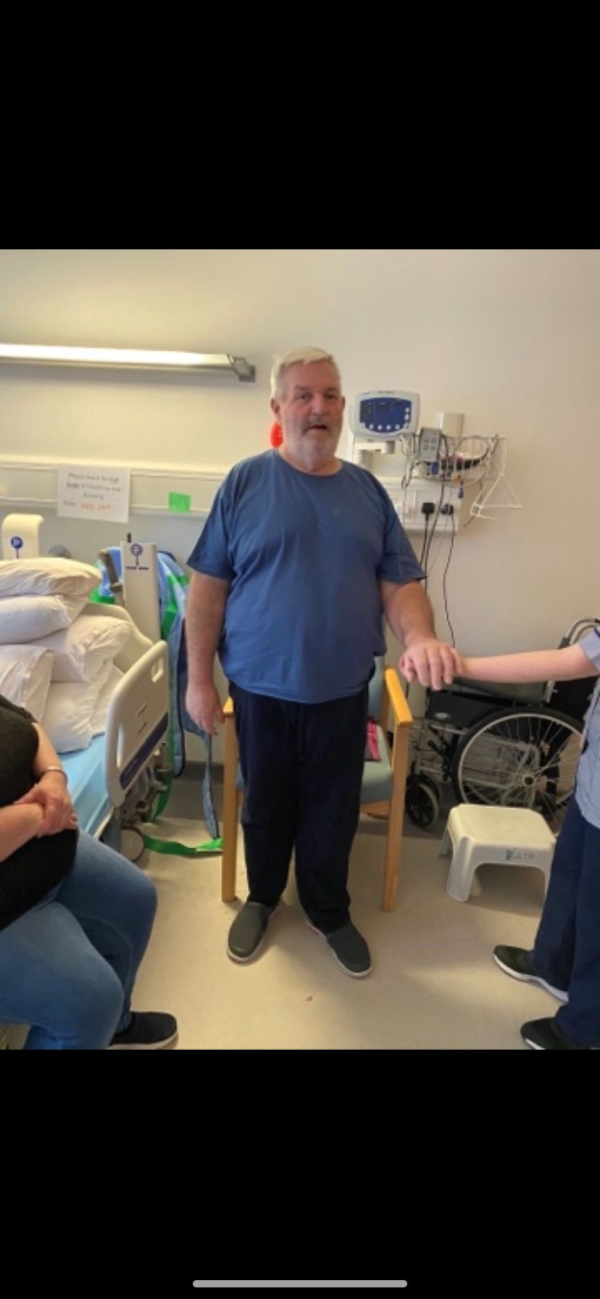
When Eugene Rankin from Tamnaherin heard a strange noise in his head whilst out working in his lorry yard, he never could have imagined it would lead to a stroke at the age of just 61, and a four-year life-changing recovery journey. Eugene recalls; “I was in the yard working on my lorry when out of the blue I heard a noise in my forehead. The moment that happened I knew I was in real trouble- my body just told me. I started to walk towards my house and when I got to the grass at the back of it, I had to get myself to the ground as I knew I wouldn’t make it any further and I didn’t want to fall on concrete. I knew I had had a stroke as the power had gone on my left-hand side.”
“My wife phoned 999 and the Rapid Response team were there within 10 minutes, with the ambulance arriving about 15 minutes later. I was taken to Altnagelvin Hospital, got through A&E, was scanned and was in the ward within an hour. I am very grateful I was seen so quickly as time is of the essence with a stroke.”
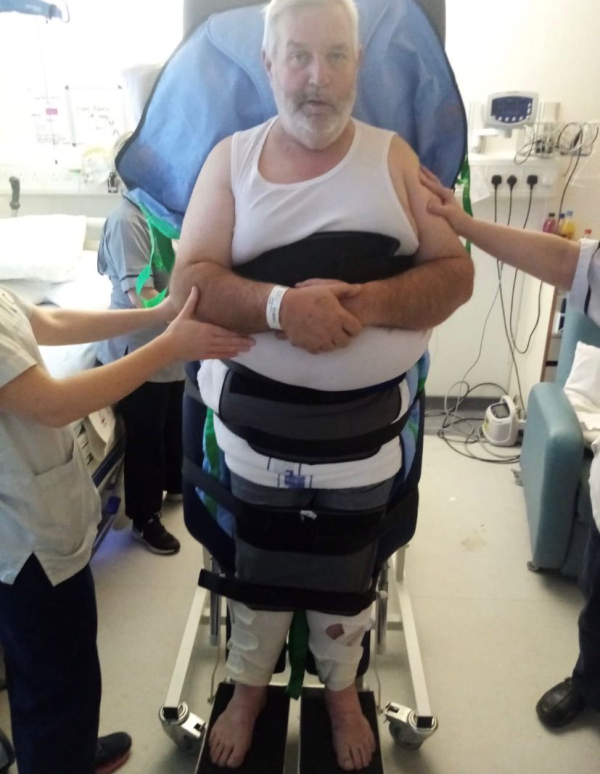
It wasn’t a quick stay in hospital for Eugene however as his stroke was severe and required him to have 3 months of intensive rehab. Eugene explains; “My left side was completely paralysed, even my stomach- I didn’t feel hunger or anything. I had to be hoisted out of bed into a chair which I then had to be propped up in as without support I just slumped over.”
“I had intensive rehab over 3 months. At the start I couldn’t move anything even though I was trying so hard, and the sweat was running off me. The physio team had to use a tilt table to get me on my feet. After some time, I got a bit of movement in my knee and the team worked with that, doing different exercises and gym work to keep me progressing. It was a hard slog over those 3 months to try and get myself moving again but I managed it, with the aid of a quad walking stick.”
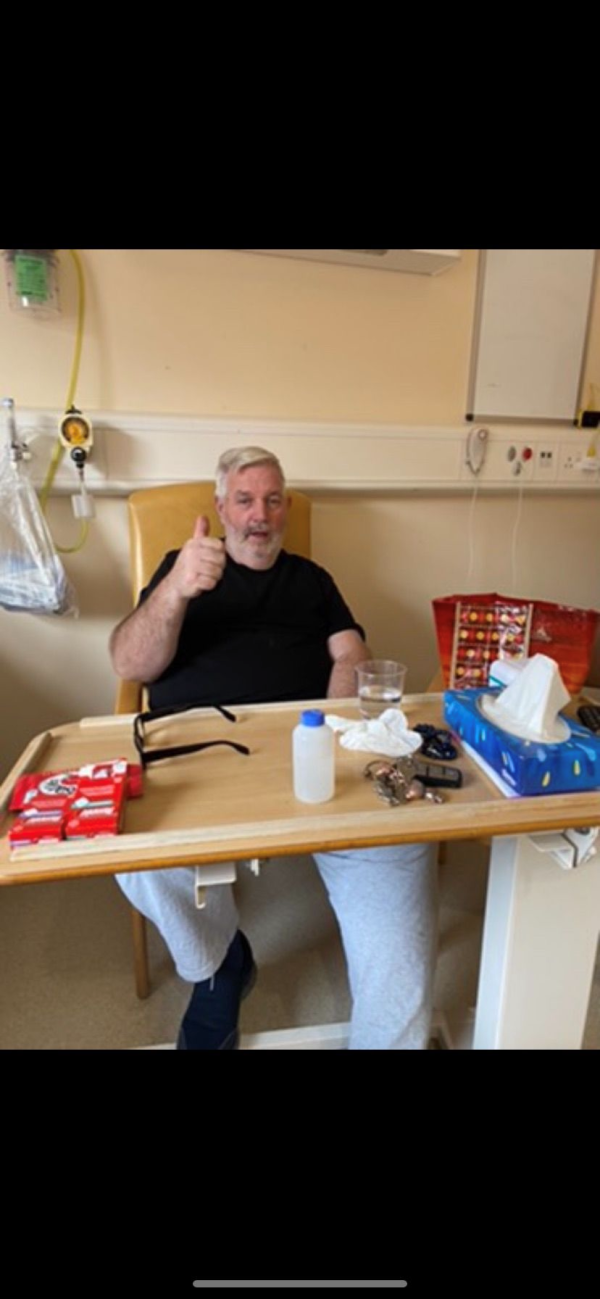
Eugene continues; “I was moved to Waterside Hospital for further rehab and the physios there were great. Then the COVID-19 pandemic started so I was discharged from hospital. My physiotherapy continued at home and that’s when I was put in touch with Northern Ireland Chest Heart & Stroke. They really helped get me back on my feet.”
Eugene attended the charity’s Post Rehab Exercise Programme (PREP). PREP is a physiotherapy led, community-based course which helps rebuild people's lives after stroke through exercise and education. It is designed for stroke survivors who have completed the statutory rehabilitation provided by the NHS to meet their longer-term care needs.
Eugene says; “PREP was great. The exercises were really useful as I was determined to recover as best I could. I also still go to the charity’s Wellness Sessions which give lots of great information about staying healthy, exercise and looking after your mental wellbeing. I think that is particularly important because you have good days but there are also days when there is an element of grieving for the person you were before you had a stroke. For me, going from being an active person, working etc. it was an awful shock to the system.”
Eugene found the charity’s support was very important to his recovery journey and he decided he wanted to fundraise for them to give something back. He says; “I wanted to raise money to help other people. I have come a long way but there are people who have had strokes that haven’t recovered as well as me and I wanted to do something to help NICHS be there for those people.”
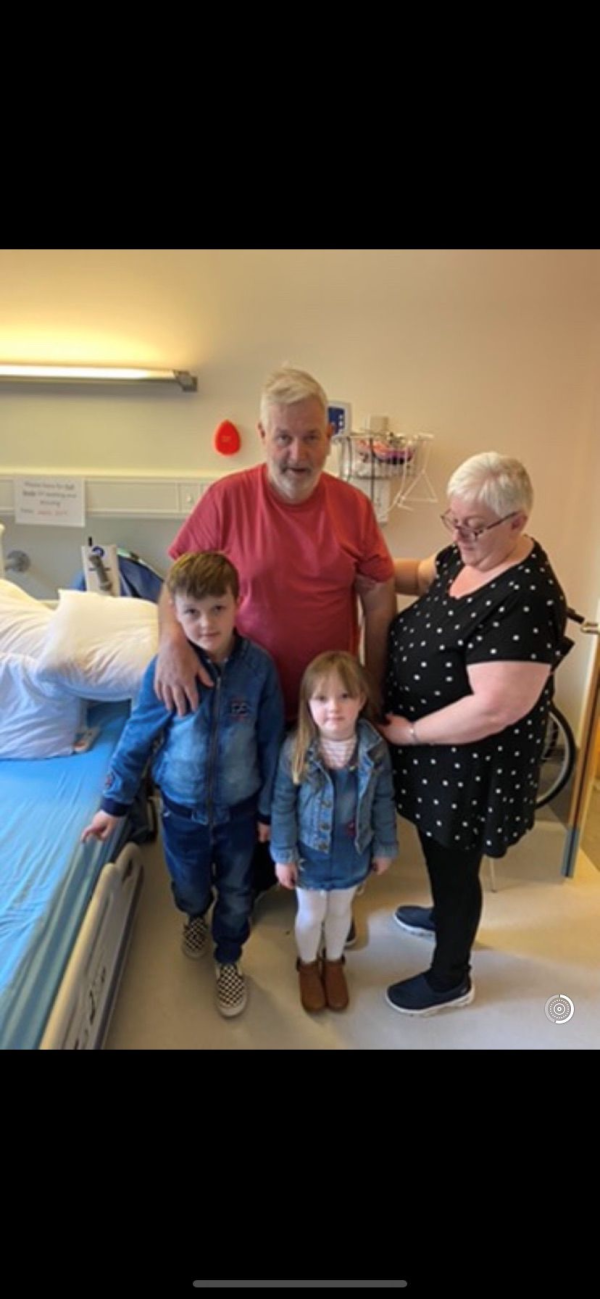
Eugene and his family organised a social evening in Gransha Social Club recently which raised a phenomenal £12,170. Eugene says; “I am delighted so much money was raised for NICHS. My community, friends and customers were so generous, and I would like to thank everyone who supported the event and donated. I never thought we would raise anywhere near that amount.”
Eugene hopes sharing his story will help bring hope to other stroke survivors. He says; “I have come a long way from being completely paralysed. I am now able to get about my house without using a stick, although I still use one outside the house just to be safe. I am back doing lots of things I used to- I go shopping in town, I go on holiday, and I am even back driving.”
“I’ve also just got a purpose-built step made for the pit in my garage that I used for working on lorries. I had my stroke after working in the pit and I haven’t been able to get into it for the past 4 years- now I can. I was determined to get down again, so I can get back to looking at vehicles.”
“I never thought in my wildest dreams I would have a stroke, but it can happen to anyone. I would tell people, there is light at the end of the tunnel after a stroke however. The light might not be there every day, but it is there. You don’t have to give up on life.”
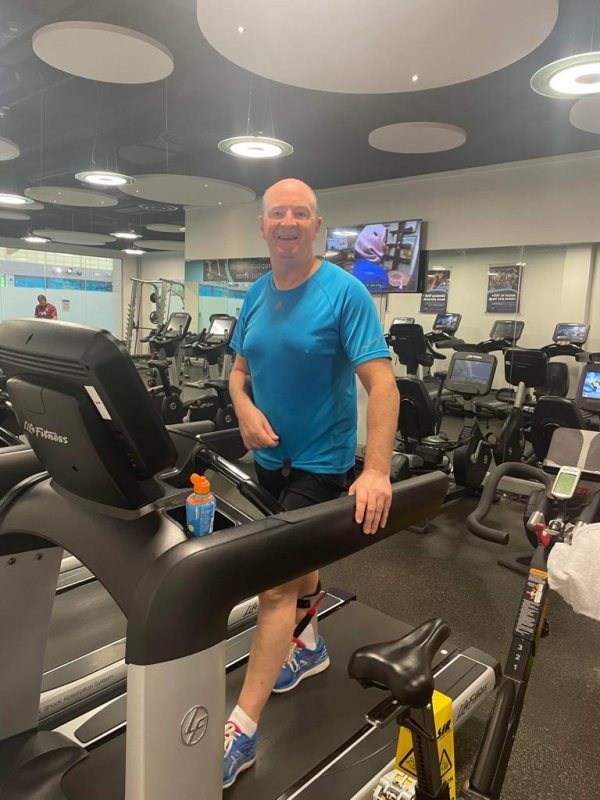
Oran McBride FROM Derry also didn’t give up on life when he had a severe stroke 3 years ago at just 53 years old. Oran went from exercising 6 days a week to having to learn how to walk and talk again. Oran explains, “One morning I felt something like a spasm in my right calf. It felt like it was jumping by itself, and it just didn’t seem right to me because I trained 6 days a week and was super fit, but it was like nothing I had felt before.”
“I sat down for about 10 minutes but when I got up the spasm started again. I just knew something was wrong. I have a good friend who is a retired GP, so I phoned him, and he advised I go to the hospital to get it checked out. I went to Altnagelvin Hospital and had a CT scan. The results didn’t show anything up, but the doctors said they were going to keep me in for monitoring and at that stage I thought I might get home the next day. When I woke up the next morning and tried to move however, my movement on the right side of my body had gone. There was nothing, absolutely no movement- it was terrifying.”
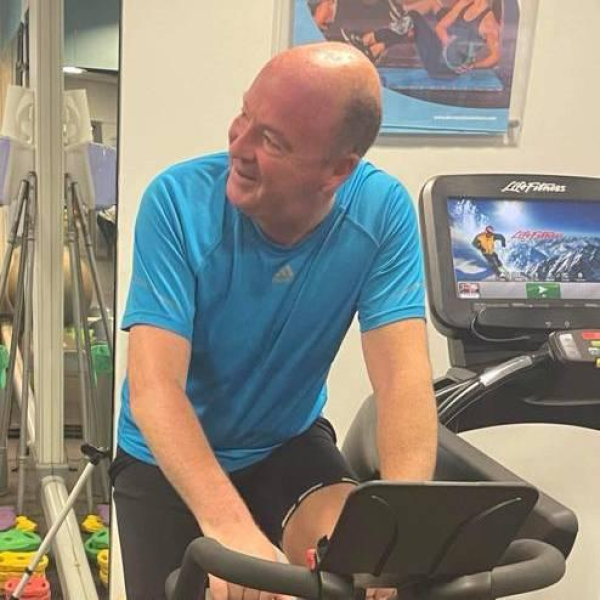
Oran continues; “This was at the start of the COVID-19 pandemic, so nobody was allowed into the ward to be with me. I was on my own and I didn’t know what was happening. I was later sent for an MRI scan, but the results didn’t come back for hours. I was alone all that time, and the mental impact was awful.”
“The doctors eventually explained I had had a complete blockage to my brain. They also said my blood pressure levels were at a critically high level which I was completely unaware of. I was given medication and they got my blood pressure under control as much as possible but by that stage it was too late for me to have the clot busting drug, Thrombolysis, and unfortunately, I just had to let nature take its course.”
“Although my brain was injured, I can remember everything that went on during that time in hospital, but I could not communicate. Simple questions and instructions, like ‘how many fingers am I holding up?’, ‘touch your nose’- I couldn't answer or do any of them. I was telling myself, ‘come on, do what the doctor is telling you’, but I just couldn’t, my body wouldn’t respond. It was really difficult, but I was then able to see my wife and we discussed things and I said, ‘you know what, I have a family, I have you, I need to keep going for everybody’. However, the not knowing what happened or why it happened was very hard. I thought I was the last person who would have a stroke- I only took a very odd drink, I never smoked, I ate well, slept well, I was physically very fit. There were a lot of questions going through my mind as to why this had happened.”
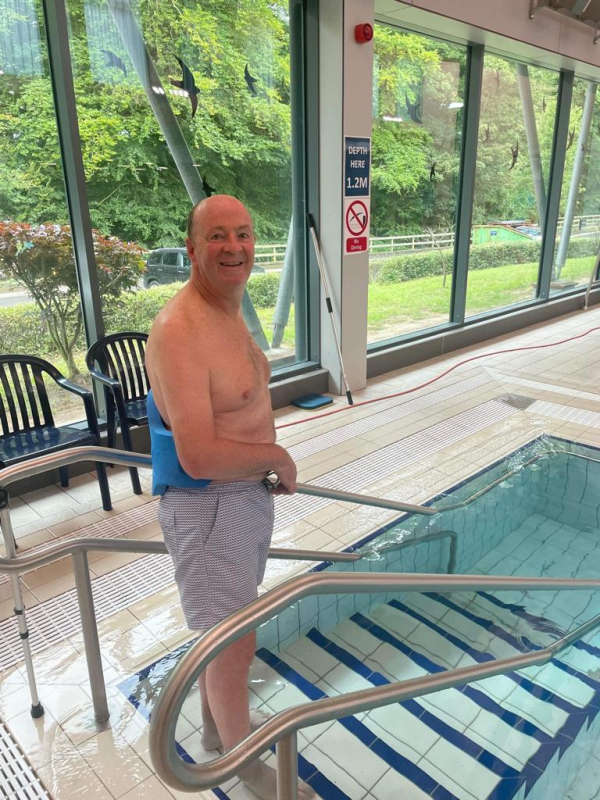
Oran started rehab within a few days of being admitted to hospital which was very important to him. He explains; “I wasn’t sure I’d be able do anything, but I had the mentality that I wanted to get up and start rehab straight away which was key. The rehab team at the hospital were brilliant. They pushed me to my limits- I had to relearn how to walk, how to talk, and to try and use my hands again. I spent a month in Altnagelvin Hospital and was then transferred to Waterside Hospital where I spent a further month completing rehab.”
When Oran was discharged from hospital, he continued his rehab journey at home and sought out external agencies who might be able to provide support. That is when he found out about Northern Ireland Chest Heart & Stroke. Like Eugene, Oran attended PREP and found the charity’s support and help invaluable. He says; “Everyone at the NICHS groups knows what it’s like to live with a stroke. They understand. That is so important, it really helps. Working with NICHS has been brilliant for me. PREP has helped me physically but mentally it’s really helped too. The team provide great support and information to help you on your recovery journey.”
Oran is someone who has always liked to set goals and he achieved one of his most challenging recently in aid of NICHS. Oran explains; “I go to gym sessions at the Old Library Trust which are focussed on supporting people with health issues and disabilities to exercise safely. One of the instructors put the idea of doing a triathlon into my head. I never thought I would do something like that again, but he said, ‘you're back in the pool, you're on the spin bike, you're on the treadmill walking. Why don’t you do one?’ I just thought, ‘right, that's my next goal’. I decided to do it for NICHS because they give so much to people living with stroke, chest and heart conditions through their services and groups, and I thought it was time for me to give something back.”
Oran’s original target was to raise £500 for the charity but he far exceeded this, reaching an amazing £4000. He says; “I didn’t think I would raise so much but it’s fantastic. My triathlon consisted of 15 lengths of the swimming pool, a 12-mile spin and a 1km walk on the treadmill. On the day I didn't know how I was going to do but I was fine. People called in to wish me well and the adrenaline helped but my mindset was ‘just do it’ and I felt a great sense of achievement when I finished.”
Oran has an inspirational way of looking at his stroke, saying; “After I was able to come to terms more with my stroke, I found I was actually much happier in life than before. Although I have my physical disabilities- I’ve lost total flexion in my right leg and only 30% of my arm power has come back- mentally I’ve accepted it. I’ve learnt to slow down. Beforehand life was just hectic, but I had a lot of time to think after my stroke. I have had to learn to adapt and look at things from a different point of view.”
“I have a good mindset and good people behind me, like my wife Edel. She is basically my right side now- it's not just me who the stroke has affected it’s her also and she has never once complained. Edel has been a tower of strength and continues to be.”
“I try and take the positives out of what I have and what I can do and work on that. Every day is another day and that's a good day. I always say there are people worse off than me- I’m lucky, I got another go in life.”
Ursula Ferguson, Director of Care Services at Northern Ireland Chest Heart & Stroke (NICHS) comments; “We are so thankful to Eugene and Oran for sharing their stories and raising awareness of stroke on International Men’s Day, and for supporting our work by raising these incredible sums of money.”
“Having a stroke is a life-changing reality for thousands of people in our local community every year. As well as the negative impact on physical wellbeing, stroke can reduce independence, confidence, and happiness. Stroke can also affect relationships, take away jobs and careers and render some families isolated within their own homes- but NICHS is here to help with expert care and support.”
“The help available from our Care Services team is extensive and, alongside PREP, includes family support, health education programmes, our Wellness Sessions, Young Stroke groups, a Return to Work programme and emotional support.”
“Our team works across Northern Ireland with people of all ages affected by stroke, alongside their families and carers. They are dedicated to supporting people in adjusting to life with a stroke condition, helping them to enjoy life to the full, re-engage with hobbies, and improve their confidence, independence, and overall quality of life.”
If you have been affected by stroke and need support visit nichs.org.uk/care-and-support/stroke-support for further information about NICHS’s stroke support services.
